Despite my existential doubts, I have always considered myself a fairly ambitious person. Of course, between my education by two driven parents—you don’t go from cleaning lady to director without a bit of ambition—and a potential but still elusive ambition gene, I don’t have anything to brag about. But, for some reason, since I was a little kid, people kept on saying I would probably go onto doing great things.
I never quite understood what they meant by “great”, and I suspect we had different definitions, but what matters is that calling someone ambitious—whether a kid or an adult—is considered a compliment. Which is probably why many parents try so hard to raise ambitious children. I kid you not, the Huffington Post published an article titled: “Six Secrets to Raising a Child Like Malala.”
Ambitious people are supposed to have a strong determination to raise above their current condition and a drive to be successful—whatever that means to them. In Western society, it’s considered a valuable trait as it usually reflects a better visualisation of the future, a healthy self-esteem, and a higher power of abstraction. The issue is that ambition often constitutes a trilemma: a hard choice between three options or the complete impossibility to combine three different options.
From useasy triangle to impossible trinity
First, let’s have a look at what exactly a trilemma is. The term trilemma comes from the much older term dilemma, from Greek: δίλημμα “double proposition”, a choice between two difficult or incompatible options. As we mentioned, a trilemma involves three difficult or incompatible options.
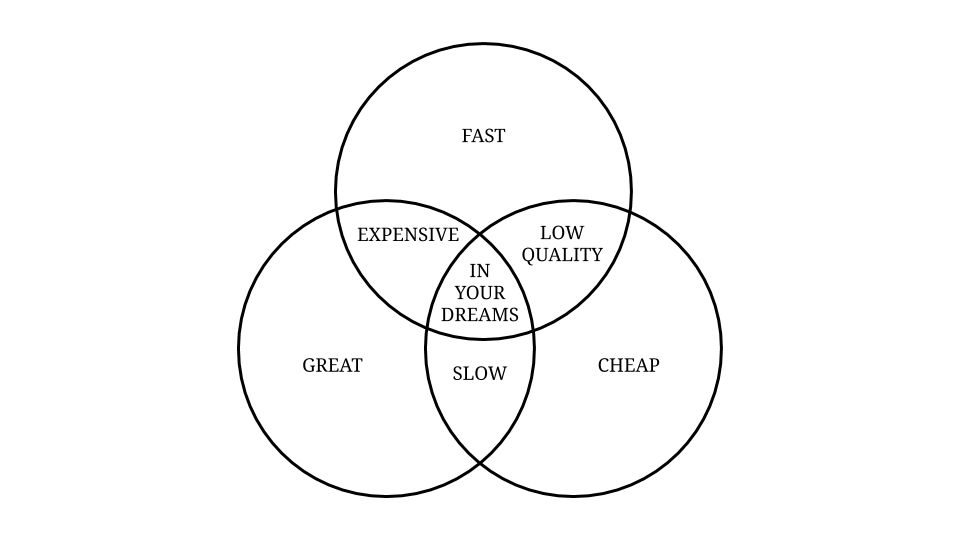
A famous trilemma in the technology space is the project management trilemma. Do you want the end result to be great quality, to get it fast, and cheap? Too bad, you can only pick two. You could get it fast and cheap, but the quality will suffer. You can have great quality, fast, but you’ll need to pay more.
Another fun trilemma is known as the Zizek trilemma, attributed to Slovenian philosopher Slavoj Žižek, which illustrates the impossibility of demonstrating sincere support of the communist regime while also being honest and intelligent.
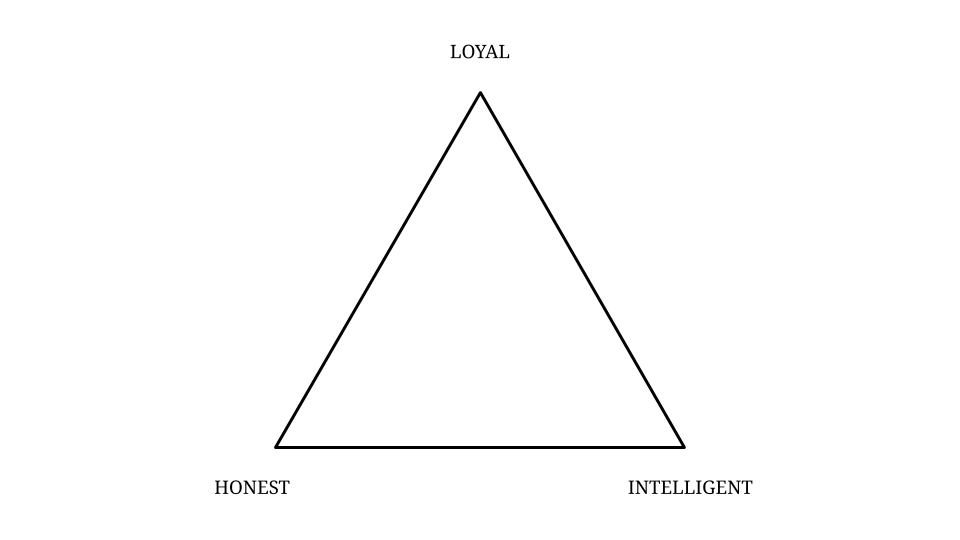
These two are quite fun, but trilemmas can be pretty serious. For instance, the Trilemma of the Earth, also called the 3D Trilemma, is used by scientists working on environmental protection to demonstrate the conundrum we’re currently facing in saving our planet. Do you want to develop the economy, save energy, and protect the environment? Again, you can only pick two.
A growing economy demands more energy, which means more emissions impacting the environment, which result in compensional costs for pollution in turn negatively impacting economic growth. You have an economic growth constraint, an energy resource constraint, and an environmental capacity constraint.
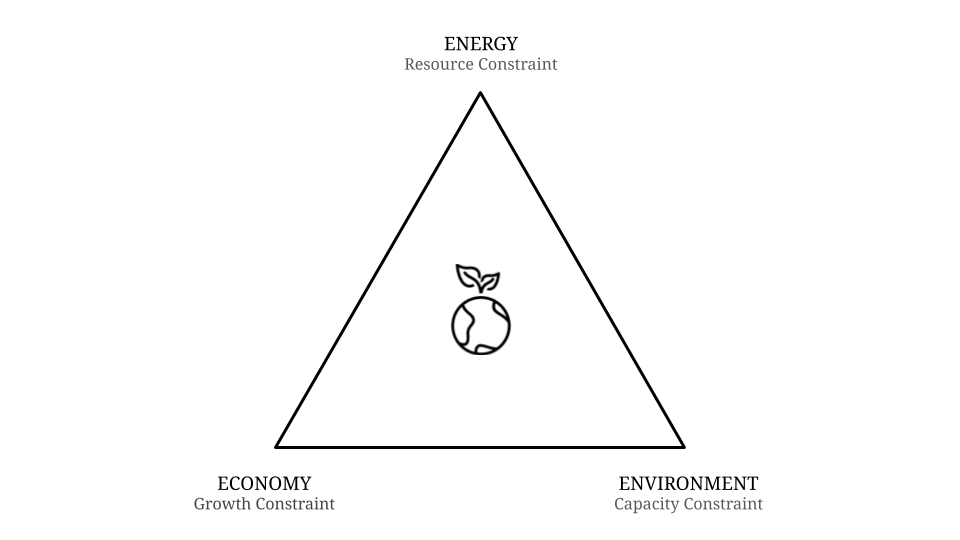
It’s important to note that trilemmas constitute either a hard choice or the complete impossibility to reconcile three options. In the case of saving our planet, it is possible to reconcile the three options with sustainable economic models, though it won’t be easy and economic growth may suffer.
The way we envision society also constitutes an interesting trilemma. The Pinker social trilemma, named after psychologist Steven Pinker, states that society cannot be simultaneously fair, free, and equal.
- Fair. People who work harder get wealthier.
- Free. Parents will leave most of their inheritance to their kids.
- Equal. Everyone begins life with the same fortunes.
See the problem?
Trilemmas have existed since the dawn of times. One of the first known ones is called Epicurus’ trilemma, which rejects the idea of an omnipotent and omnibenevolent god. It goes like this:
- If God is unable to prevent evil, then he is not all-powerful.
- If God is not willing to prevent evil, then he is not all-good.
- If God is both willing and able to prevent evil, then why does evil exist?
But we are surprisingly bad at identifying trilemmas in our own lives, which makes us either chase impossible outcomes, or underestimate how big of a challenge achieving some of our ambitions will be.
The life trilemmas
The Student Trilemma is a famous one. It states that you can’t get good grades, an exciting social life, and enough sleep all at the same time. You can only pick two.
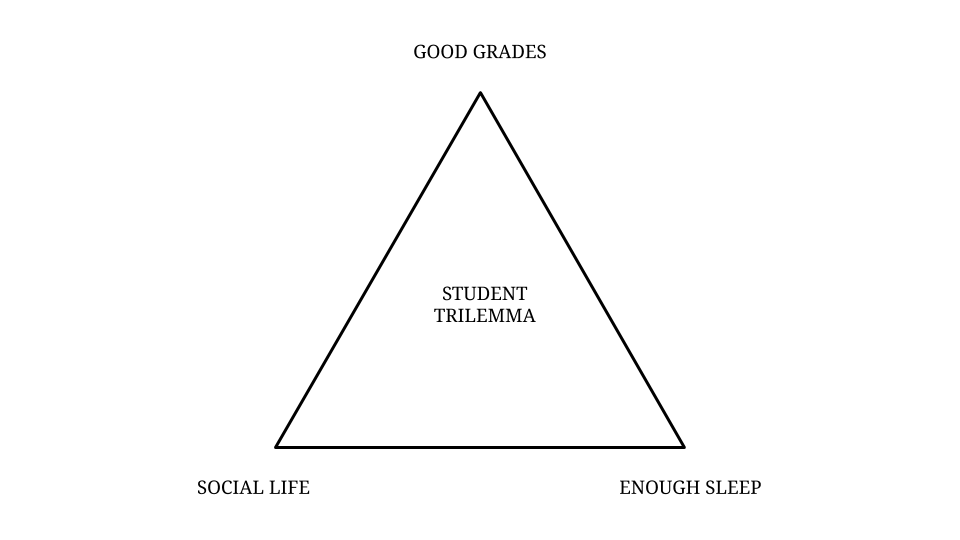
But adults experience many trilemmas too. Let’s say you are an ambitious person with some goals of yours. You want to get a promotion at work and launch that side project. So you work hard during the day, and some more when you get back home. The problem? You’re not single, and your partner is starting to miss your evening conversations. Let’s visualise what your situation looks like.
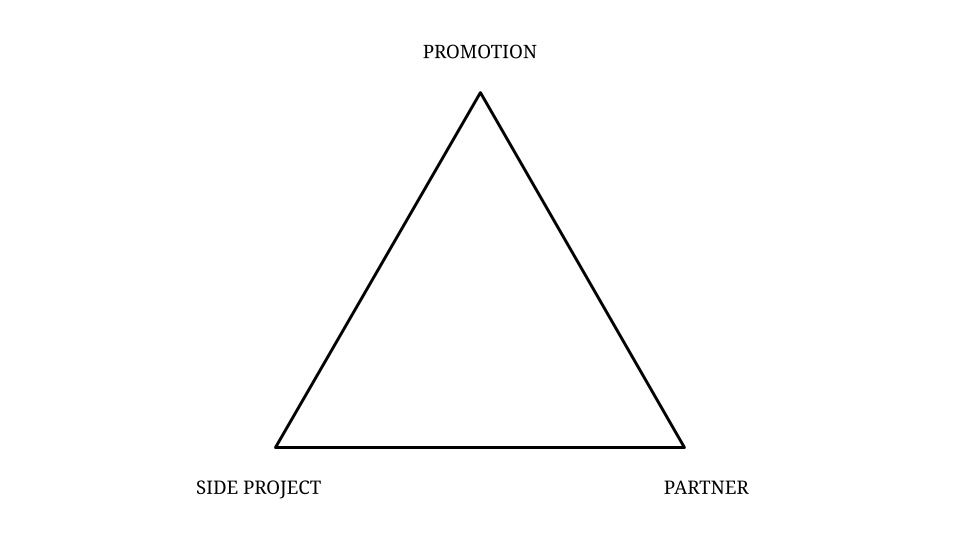
The crux of this personal trilemma is time. You basically don’t have enough time to attend to these three important goals that constitute your current ambitions: be a good partner, do well at work, launch a side project. It’s a trilemma because there’s no easy or obvious solution encompassing all three goals.
Let’s have a look at another example, which we will call the Nomad Trilemma. You want to explore as much of the world as possible, build real friendships with the people you meet, and use your travel time to reflect. These three goals, again, constitute a trilemma.
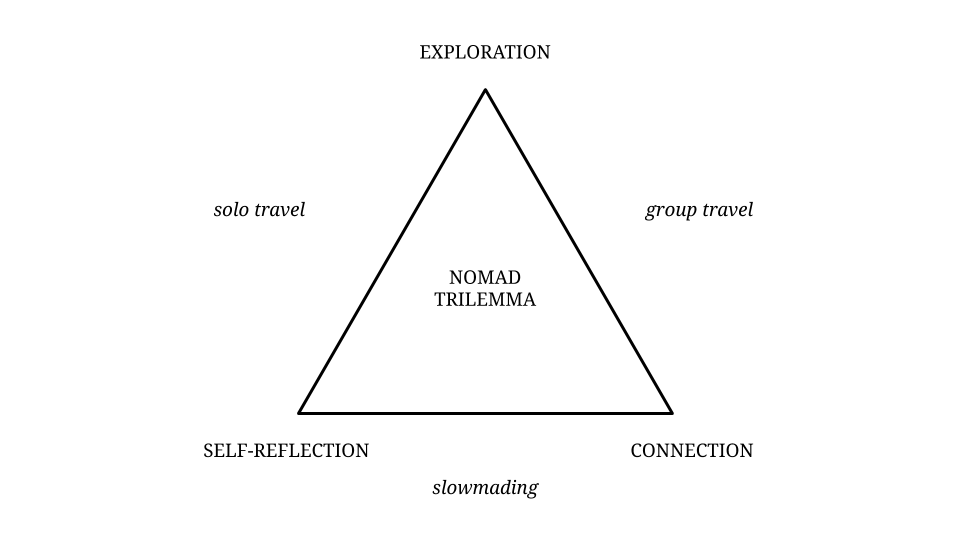
You can either explore a lot of the world and carve time for self-reflection, but that won’t make it easy to build new and lasting friendships. Or you could make new friends and explore lots of the world by joining groups, but that won’t leave much time for self-reflection. Finally, if you want to have time both for yourself and for building new relationships, you’re probably better off staying in the same place for a little while, which means fewer new places to explore.
Once you start paying attention, you will see trilemmas everywhere in your life. Again, trilemmas should not be seen as obstacles that are impossible to overcome. It’s just important to be aware of them so you can make your decision en toute connaissance de cause—with full knowledge of the factors, potential outcomes, and impact of your decisions.
The ambition trilemma
As an entrepreneur, the trilemma that affects me the most is what I call the Ambition Trilemma. It’s exceedingly difficult to achieve perfect stability, freedom, and wealth at the same time. First, let’s have a look at a few definitions.
- Stability. The Cambridge Dictionary defines job stability as “the fact of an employee, or a group of employees, being able to keep the same job for a long time.” Let’s define stability as the ability to work on the same thing for a long time.
- Freedom. The ability to decide what you are working on and who you are working with.
- Wealth. Making money to a point you don’t need to worry about it. For reference, the Cambridge Dictionary’s primary definition for wealth is “a large amount of money or valuable possessions that someone has.”
Why do these constitute a trilemma?
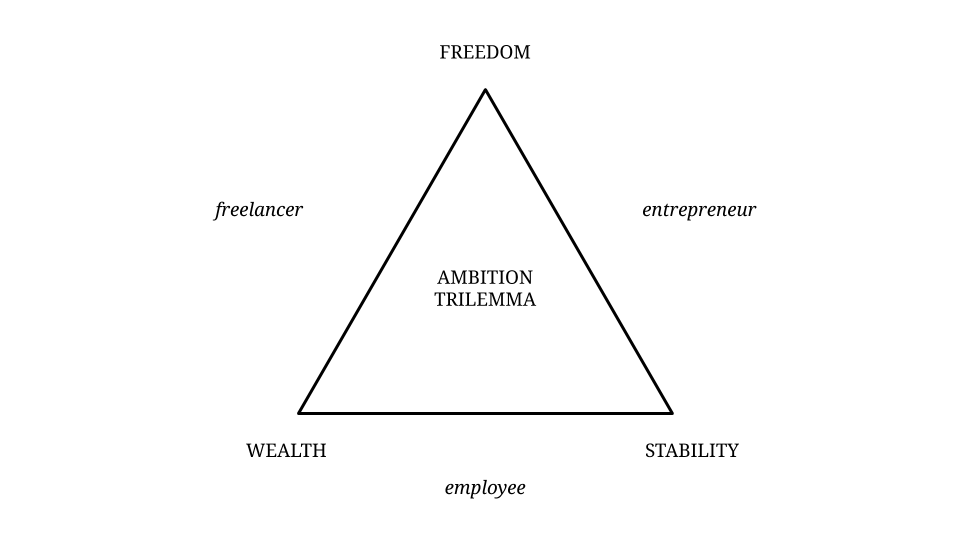
Let’s say you want your freedom and to work on something for a certain amount of time. You decide to start your own company. You have freedom and stability, but no guarantee of wealth. The moment you want to guarantee a certain income—let’s say you want to focus on the product and not have to worry about paying your rent—and take outside investment, you relinquish some of your freedom.
Let’s say what you want is a stable job and money. So you decide to work for a big corporation. It’s unlikely you will have much freedom in terms of deciding what to work on. You could forgo your stability and become a freelancer, but then you’d have no guarantee of wealth anymore—as you wouldn’t have a fixed salary.
- Freedom + Stability = no guaranteed wealth (e.g. entrepreneur)
- Stability + Wealth = no guaranteed freedom (e.g. employee at a big corporation)
- Wealth + Freedom = no guaranteed stability (e.g. freelancer)
It’s hard but technically possible to overcome all of these. For instance, if you’re an employee at a big corporation, you could negotiate working from home one day a week. Or better yet, you could be one of the lucky people in a remote job—as of early 2020, only about a thousand startups in the world are hiring remotely, which is a tiny pool of job opportunities. If you’re a freelancer, you could get a long-term contract which would bring you some stability, even though it would arguably impact your levels of freedom.
My point is: the ambition trilemma is not unsolvable, and trilemmas in general—especially, the small, personal, daily ones—are rarely unsolvable either. But we often tend to not even notice we may be facing one, approaching our ambitions as if hard work will be enough to achieve all of them. Turns out—life equations are often more complex than they seem.
P.S. The concept of a trilemma is of course arbitrary. You could face a tetralemma, a pentalemma, etc. As long as you realise there are usually more than two options and the equation is rarely linear, you can theoretically start considering as many variables as necessary. Needless to say, the bigger the number of options, the higher the complexity.
